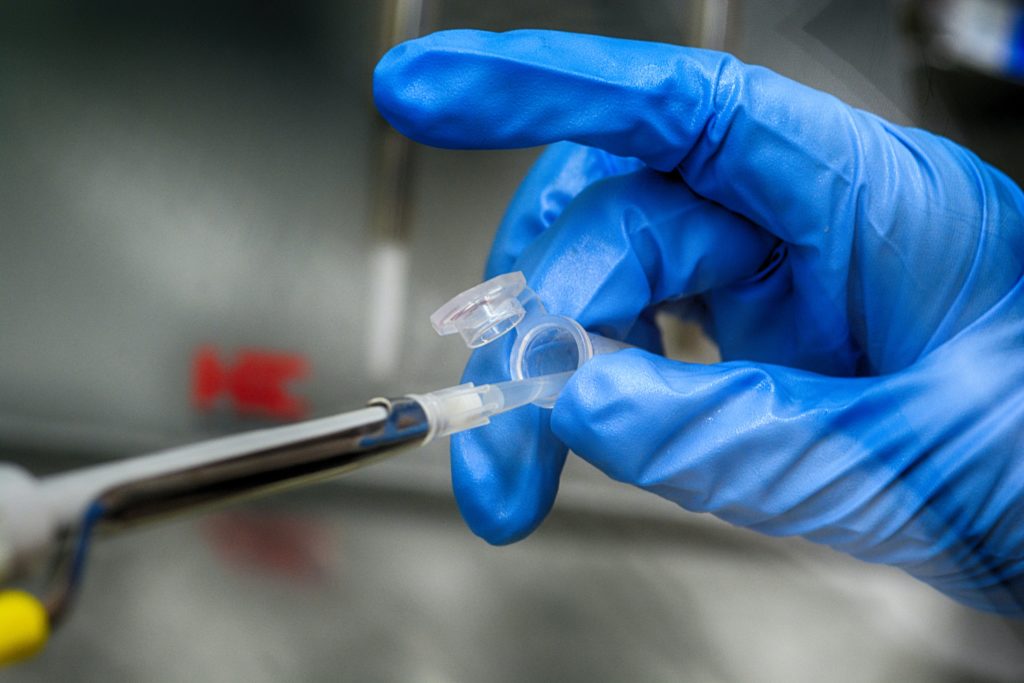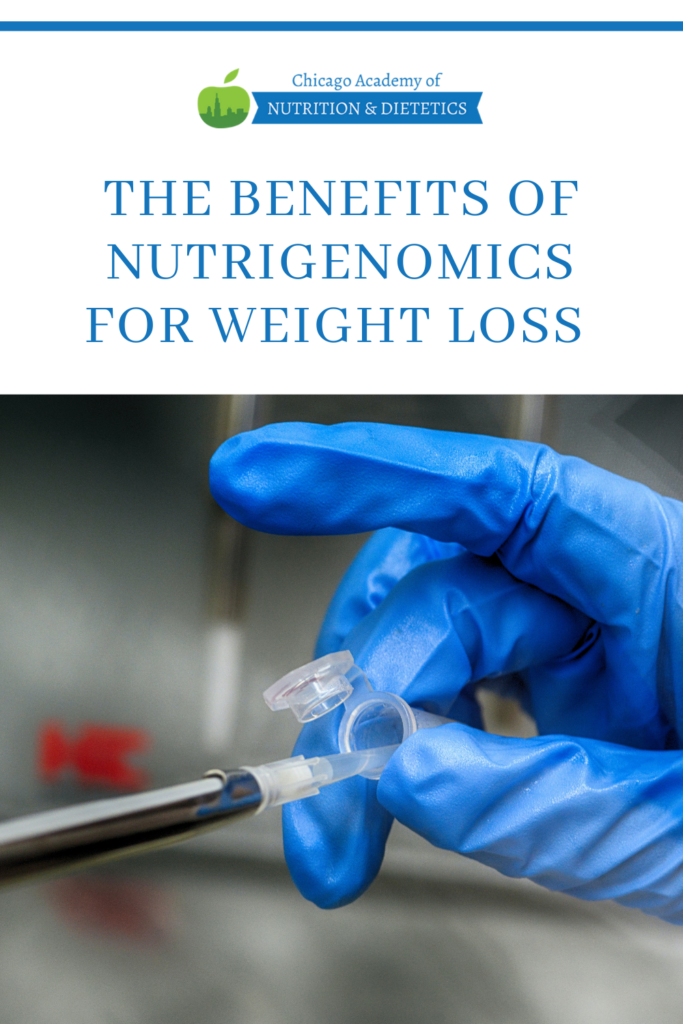The Benefits of Nutrigenomics for Weight Loss
The Benefits of Nutrigenomics for Weight Loss
Nutrigenomics is an emerging science that focuses on the relationship between genes and nutrition. A significant area of study in nutrigenomics is the effect of genes on weight and related eating behaviors.
Considering these genes in nutrition counseling can improve weight loss by producing more insightful diet recommendations and increased behavior change.
Genes & Obesity
Obesity is caused by multiple factors, including environment, behavior, and genetics. According to the CDC, since 2006, studies have found more than 50 genes associated with obesity. (1) Two of the most common obesity-associated genes are FTO and MC4R.
The FTO gene codes for the fat mass and obesity-associated protein. There is a strong relationship between its risk alleles and obesity. More recently, studies support that the gene’s risk for obesity is related to its effects on satiety and energy intake. (2)
The MC4R gene codes for the melanocortin-4-receptor found in the brain. The melanocortin system is one way the body regulates feeding behavior and body weight, through hunger and satiety signals to the brain. MC4R risk alleles are associated with obesity, reduced satiety, and more food cravings. (1-3)
Nutrigenomics & Weight Loss
We can now take our understanding of genetics and obesity a step further by considering how diet interacts with obesity genes. Nutrigenomics shows us certain diet modifications can improve weight loss in those who have genetic risk alleles for obesity.
For instance, research shows that individuals with a specific risk allele of the FTO gene benefit from a high protein diet. (4-6) In one 2-year study, carriers of the risk allele had a greater reduction in weight and fat distribution in response to a high-protein diet than those without the risk allele. (4)
Individuals with MC4R risk alleles can benefit from nutrition counseling focused on mitigating hunger and food cravings. This can include the practice of mindful eating and a diet higher in protein (7) and healthy fats to promote feelings of satiety and fullness.
Nutrigenomics’ Impact on Behavior Change
It should not be lost on dietitians the impact personalized diets have on behavior change and compliance. As a dietitian who uses nutrigenomic testing in my practice, I have seen patients become more receptive to recommendations and more motivated to follow them. Research backs this up. Research shows the use of nutrigenomic testing for diet personalization leads to better compliance and longer-term maintenance of diet and weight loss. (8-12)
Final Note for Dietitians
There are proven benefits to the use of nutrigenomics for weight loss. However, as a recent report from the Academy of Nutrition and Dietetics (13) accurately states, genetic testing should be used as one piece of a nutrition assessment to give a holistic, personalized diet intervention. The test should also consist of only well-researched genes. Nutrigenomics is a new science, and not all genes are ready for clinical use.
Resources
- Genomics & Precision Health: Genes and obesity. CDC Website. Accessed Sep 27, 2020. https://www.cdc.gov/genomics/resources/diseases/obesity/obesedit.htm
- Papoutsakis, C. Gene–Diet Interactions and Obesity Indices. Curr Nutr Rep1, 142–152 (2012). https://doi.org/10.1007/s13668-012-0019-x
- Acosta A, Camilleri M, Shin A, et al. Association of melanocortin 4 receptor gene variation with satiation and gastric emptying in overweight and obese adults. Genes Nutr. 2014;9(2):384. doi:10.1007/s12263-014-0384-8
- De Luis et al., Effects of a High-Protein/Low-Carbohydrate Diet versus a Standard Hypocaloric Diet on Weight and Cardiovascular Risk Factors: Role of a Genetic Variation in the rs9939609 FTO Gene Variant. J Nutrigenet Nutrigenomics. 2015;8(3):128-36. doi: 10.1159/000441142. Epub 2015 Oct 13.
- Huang et al., FTO genotype, dietary protein, and change in appetite: the Preventing Overweight Using Novel Dietary Strategies trial. Am J Clin Nutr. 2014 May;99(5):1126-30. doi: 10.3945/ajcn.113.082164. Epub 2014 Mar 12
- Zhang X, Qi Q, Zhang C, et al. FTO genotype and 2-year change in body composition and fat distribution in response to weight-loss diets: the POUNDS LOST Trial [published correction appears in Diabetes. 2013 Feb;62(2):662. Smith, Steven R [added]; Bray, George A [added]]. Diabetes. 2012;61(11):3005-3011. doi:10.2337/db11-1799
- Huang T, Zheng Y, Hruby A, et al. Dietary Protein Modifies the Effect of the MC4RGenotype on 2-Year Changes in Appetite and Food Craving: The POUNDS Lost Trial. J Nutr. 2017;147(3):439-444. doi:10.3945/jn.116.242958
- Arkadianos I, Valdes AM, Marinos E, Florou A, Gill RD, Grimaldi KA. Improved weight management using genetic information to personalize a calorie controlled diet. Nutr J. 2007;6:29. Published 2007 Oct 18. doi:10.1186/1475-2891-6-29
- Nielsen DE, El-Sohemy A. A randomized trial of genetic information for personalized nutrition. Genes Nutr. 2012 Oct;7(4):559-66. doi: 10.1007/s12263-012-0290-x. Epub 2012 Mar 11. PMID: 22407352; PMCID: PMC3448037.
- Nielsen DE, El-Sohemy A. Disclosure of genetic information and change in dietary intake: a randomized controlled trial. PLoS One. 2014 Nov 14;9(11):e112665. doi: 10.1371/journal.pone.0112665. PMID: 25398084; PMCID: PMC4232422.
- Horne J, Madill J, O’Connor C, Shelley J, Gilliland J: A Systematic Review of Genetic Testing and Lifestyle Behaviour Change: Are We Using High-Quality Genetic Interventions and Considering Behaviour Change Theory? Lifestyle Genomics 2018;11:49-63. doi: 10.1159/000488086
- HorneJ, Gilliland J, O’Connor C, et al. Enhanced long-term dietary change and adherence in a nutrigenomics-guided lifestyle intervention compared to a population-based (GLB/DPP) lifestyle intervention for weight management: results from the NOW randomised controlled trial. BMJ Nutrition, Prevention & Health 2020;bmjnph-2020-000073. doi: 1136/bmjnph-2020-000073
- Braakhuis A, Monnard CR, Ellis A, Rozga M. Consensus Report of the Academy of Nutrition and Dietetics: Incorporating Genetic Testing into Nutrition Care. J Acad Nutr Diet. 2020 Jul 3:S2212-2672(20)30337-3. doi: 10.1016/j.jand.2020.04.002. Epub ahead of print. PMID: 32624395.
Author:
Samantha Harmon Shuflin, MS, RDN, LDN
Instagram: @samanthashuflin
CAND Instagram
Recent Posts
Meet the Author
Bringing you the best nutrition information...
Our Academy Bloggers
CAND has several professional and student bloggers. They write about a range of topics for the public.





